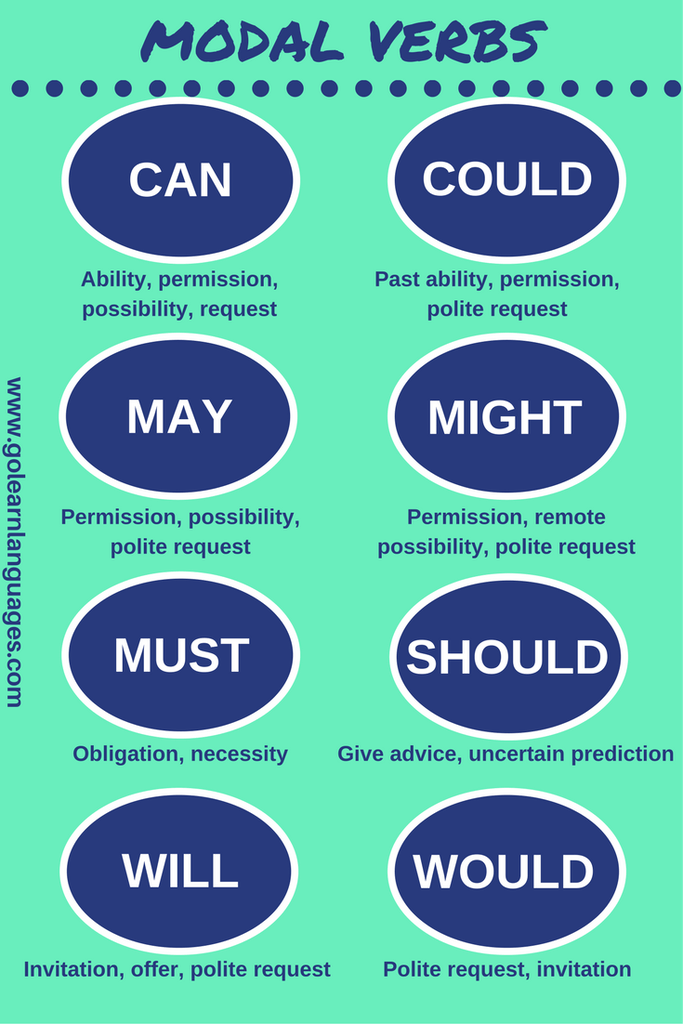Modal Verbs - Modal Verbs Matching
Modal Verbs - Modal Verbs Matching. Get 3 months membership for just €10.49 (≈ $12.48). Need and dare can be used like modal verbs modal verbs with examples However, it also has many other important uses, like to talk about wishes, requests, demands, to make predictions and assumptions, to make promises and to talk about spontaneous decisions and also to talk about habits. These verbs are auxiliary verbs, which modify the meaning of another verb in the sentence. An auxiliary verb, also called a helping verb, helps other verbs show moods and tenses.
Likelihood, ability, permission, request, capacity, suggestions, order, obligation, or advice. They are used before ordinary verbs and are used to express meanings such as permission, possibility, certainty and necessity. Certain other verbs are sometimes, but not always, referred to as modal verbs: The sea monster should go away 'should' is the. What is a modal verb?

Can/could, may/might, will/would, shall/should and must.
There's a class of helper verbs known as modals that we use to express a bunch of conditions: Ought, had better, and in. Choose the correct answers using modal verbs. Modal verbs always accompany the base (infinitive) form of another verb having semantic content. Modal verbs of deduction ability: Modal verbs are always paired with at least one other verb. First, they can be used when we want to say how sure we are that something happened / is happening / will happen. The modal verbs of english are a small class of auxiliary verbs used to express possibility, obligation, advice, permission, ability, …. After studying the following chart, try the challenging modal verb quizzes listed at the bottom of this page. The main use of the modal verb will is to form the future form of the verbs in english. This additional meaning may connote possibility, ability, and permission among others: Worksheets, printable exercises pdf, handouts to print. They don't use an 's' for the third person singular.
Ought, had better, and in. They are used with other verbs to express ability, obligation, possibility, and so on. Modal verbs (will, would, should, may, can, could, might, must) precede another verb. Modal verbs list in the english language: So, let's try out the quiz.

Ought, had better, and in.
This handout shows how modals in academic writing can change a sentence's meaning into a prediction, suggestion, or a question. A modal verb is a helping (auxiliary) verb that expresses ability, possibility, permission, or obligation. They express things like ability, permission, possibility, obligation etc. A modal verb is an auxiliary verb that expresses necessity or possibility. Correct english grammatical mistakes and enhance your writing. Worksheets, printable exercises pdf, handouts to print. They are used before ordinary verbs and are used to express meanings such as permission, possibility, certainty and necessity. Below is a list showing the most useful modals and their most common meanings: Can/could, may/might, will/would, shall/should and must. Modals, words like might, may, can, could, will, would, must, and should are helping verbs that add shades of meaning or flavor to the verbs that follow them. They are used with other verbs to express ability, obligation, possibility, and so on. Can, could, may, might, will, would, must, shall, should, ought to… Eliminate english grammar errors instantly and enhance your writing.
Modal verbs are also sometimes called modals. Ought, had better, and in. So, let's try out the quiz. A modal is a type of auxiliary (helping) verb that is used to express: They don't use an 's' for the third person singular.

Modal verbs always accompany the base (infinitive) form of another verb having semantic content.
A modal verb is an auxiliary or helping verb such as can, will, could, shall, might, should. So, let's try out the quiz. Can, could, may, might, will, would, must, shall, should, ought to… They add meaning to the main verb of the sentence and express things like permission, obligation, ability, etc. There's a class of helper verbs known as modals that we use to express a bunch of conditions: First, they can be used when we want to say how sure we are that something happened / is happening / will happen. Modal verbs and their features. Can/could, may/might, will/would, shall/should and must. They express things like ability, permission, possibility, obligation etc. This handout shows how modals in academic writing can change a sentence's meaning into a prediction, suggestion, or a question. They don't use an 's' for the third person singular. Modal verbs are used with other verbs to express ability, obligation, possibility, or talking about ability, asking permission, which includes modal verbs like can, could, must, may, might, and so on. An auxiliary verb, also called a helping verb, helps other verbs show moods and tenses.
Post a Comment for "Modal Verbs - Modal Verbs Matching"